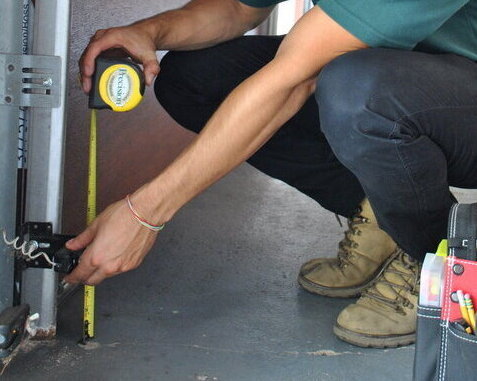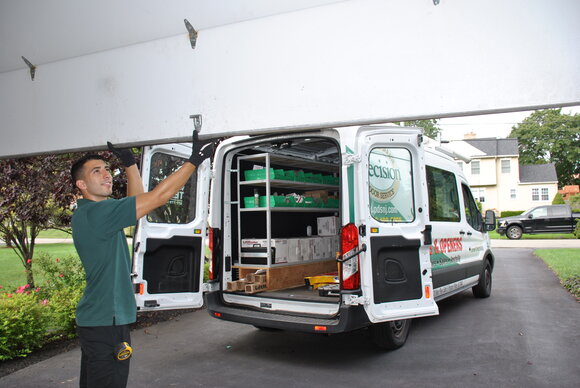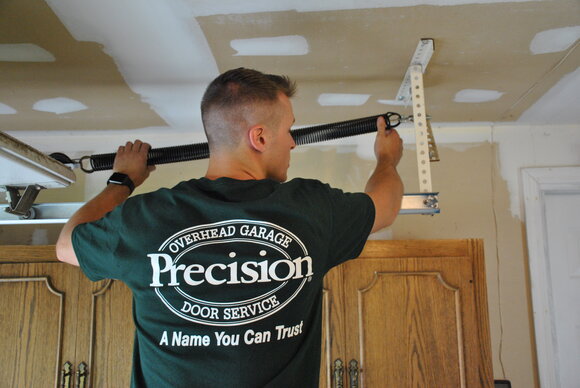12 Important Garage Door Safety Tips





WITH 724 REVIEWS
Click Here To Book Online Now





CLICK
To view local phone numbers

Because it’s the largest moving part of your home, garage door safety is critical. Improper use of a garage door can result in damage to your belongings or personal injury. Garage doors come equipped with some features meant to keep you safe. However, it’s ultimately up to you to follow the safety guidelines regarding your garage door. Read on to learn some garage door safety tips you should know.
Check the safety eyes.
Garage doors come equipped with safety eyes that are mounted on the bottom of the track near the opening. If the beam between the safety eyes is broken by a person, pet or object as the door is closing, the safety eyes send a signal to the opener to reverse and return the door to the open position to avoid injury.
The safety eyes should be mounted 3-6 inches from the ground. The wires should be pigtailed, so they don’t get disconnected. You should also ensure that the safety eyes are clear and free from debris, so the communication between the two is not interrupted.

Make sure the wall control panel is 5' from the ground.
The wall control panel is a central hub placed inside your garage that traditionally allows you to open and close your garage door with the click of a button. Depending on the model of your panel, there will also be a light button and a screen that allows you to set features and functions to meet your preferences.
The wall control panel should be mounted at least 5’ from the ground. It can be a source of fun for kids who want to play a game opening and closing the garage door, but it can lead to injury! Installing the panel at least 5’ from the ground can keep it out of the wrong hands.
Re-engage the emergency release cord.
The emergency release is a cord attached to the trolley that can be pulled to detach the garage door from the opener. This allows you to manually open the garage door to check the balance or operate the door without the opener.
If you disengage the trolley using the emergency release cord to manually operate the door, be sure to re-engage it when you’re finished. A garage door with a disengaged trolley could be dangerous for children who yank or pull on the door. Furthermore, if your garage door isn’t balanced and is left disconnected from the opener, it can come crashing down unexpectedly.
Keep fingers out of the hinges.
Whether you’re operating the garage door manually or it’s run by an opener, always keep your fingers out of the sections of the door. Please make sure you tell your children the same safety tip, so they don’t hurt themselves.

Make sure your keypad code is something only you know.
The keypad is located right outside your garage door and is used to open the garage door from the outside using a code that is set by the homeowner.
You’ll want to choose something familiar for your garage door code but not too obvious. You won’t want to make it your house number or 1234, but don’t make it something you’ll never remember.
Check the safety reversal.
The safety reversal feature, which is part of your garage door opener, ensures that if your garage door touches anything as it is closing, it will instantly return to the open position to prevent any harm or damage.
Make it a point to check the safety reversal of your garage door because it can protect your family and belongings from the force of the door as it closes. You can test the safety reversal by laying a 2x4 on the ground, and once the door makes contact with the wood as it’s coming down, it should reverse back to the open position.
Be sure the door is balanced.
A balanced garage door is important because if it is unbalanced, it can put strain on the springs and they can break which can result in injury or damage.
When checking your garage door’s balance, you’ll manually move it to 3 positions: 1/3 of the way up, 1/2 way up, and 3/4 of the way up. The door should feel not heavier than 5-10 lbs. A garage door that isn’t correctly balanced puts a strain on the opener and could mean that one of the springs is worn.

Don’t leave the door partially open.
It may seem tempting in the hot summer months, but leaving a garage door open can be dangerous. Kids running around may use the garage door as a toy. Also, if the springs aren’t quite strong enough, they can break and cause damage.
Additionally, an open garage door is an invitation to pests, big and small, to visit your garage and either cause destruction or decide to make themselves at home.
The garage door isn’t a toy.
Kids should never use the garage door as a toy or as part of a game. Do not run under the garage door, and do not attempt to grab the top and ride it. Garage door safety is very important.
Don’t run the car in the garage with the door closed–or OPEN!
This goes without saying, but we will say it anyway. You may be tempted to start your car in the garage and wait for it to warm up (or cool down) before you get in. Do not start your vehicle while it’s in the garage with the garage door closed or open! Deadly carbon monoxide can get trapped in the garage. Additionally, if you have an attached garage to your home, the dangerous gas can enter your home and pose a threat to those in your household.
Repair the door when you sense a problem.
If your garage door isn’t running correctly or is broken, call a professional for service. A garage door that is suddenly loud or operating incorrectly are red flags and you’ll want to get ahead of the problem before it’s too late.

Stay away from moving parts.
Springs, pulleys, and cables can all cause damage or injury if they are not appropriately handled. If you’re not well versed in garage door mechanics and don’t have the proper tools or training, now’s not the time to become Mr. Fix It. It’s best to leave it to the professionals so you don’t get hurt or cause more damage to the garage door parts.
Categories:
BasicsLicense
License #120079









